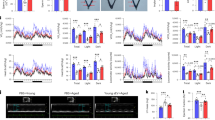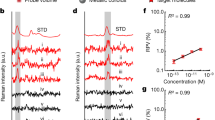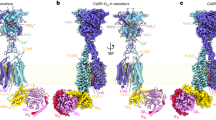Abstract
PLATELET FACTOR 4 (PF4) is a low molecular weight, heat stable protein which neutralizes heparin1,2. Recent reports indicate PF4 is released from human platelets during aggregation by adenosine diphosphate (ADP), adrenaline, thrombin and collagen3,4. It is known that human platelet aggregation in plasma containing citrate proceeds in two phases in response to adrenaline, ADP and thrombin5–8. Reversible platelet aggregation seems to be chiefly the result of changes in the platelet membrane induced by external stimuli. The second phase is accompanied by the selective release of various platelet contents, including adenine nucleotides, 5-hydroxytryptamine and certain lysosomal enzymes9. We have examined the release of PF4 in human platelet-rich plasma with particular reference to the two phases of platelet aggregation. We also compared release of PF4 with ADP release.
This is a preview of subscription content, access via your institution
Access options
Subscribe to this journal
Receive 51 print issues and online access
$199.00 per year
only $3.90 per issue
Buy this article
- Purchase on Springer Link
- Instant access to full article PDF
Prices may be subject to local taxes which are calculated during checkout
Similar content being viewed by others
References
Deutsch, E., and Lechner, K., in Biochemistry of Blood Platelets (edit. by Kowalski, E., and Niewiarowski, S.) (Academic Press, London and New York, 1967).
Niewiarowski, S., Farbiszewski, R., and Poplawski, A., in Biochemistry of Blood Platelets (edit. by Kowalski, E., and Niewiarowski, S.) (Academic Press, London and New York, 1967).
Niewiarowski, S., Poplawski, A., Lipinski, B., and Farbiszewski, R., in Exp. Biol. Med., 3, 121 (Karger, Basel and New York, 1968).
Youssef, A., and Barkhan, P., Brit. Med. J., 1, 746 (1968).
O'Brien, J. R., Nature, 200, 763 (1963).
MacMillan, D. C., Nature, 211, 140 (1966).
Mills, D. C. B., and Roberts, G. C. K., Nature, 213, 35 (1967).
Thomas, D. P., Nature, 215, 298 (1967).
Mills, D. C. B., Robb, I. A., and Roberts, G. C. K., J. Physiol., 195, 715 (1968).
Born, G. V. R., Nature, 194, 927 (1962).
Holmsen, H., Holmsen, I., and Bernhardsen, A., Anal. Biochem., 17, 456 (1966).
Day, H. J., Stormorken, H., and Holmsen, H., in Twelfth Cong. Intern. Society of Hematology, New York (1968).
Day, H. J., and Holmsen, H., Clin. Res., 16, 534 (1968).
Farbiszewski, R., Lipinski, B., Niewiarowski, S., and Poplawski, A., Experientia, 24, 578 (1968).
Author information
Authors and Affiliations
Rights and permissions
About this article
Cite this article
NIEWIAROWSKI, S., THOMAS, D. Platelet Factor 4 and Adenosine Diphosphate Release during Human Platelet Aggregation. Nature 222, 1269–1270 (1969). https://doi.org/10.1038/2221269a0
Received:
Revised:
Issue Date:
DOI: https://doi.org/10.1038/2221269a0
This article is cited by
-
Transient blood thinning during extracorporeal blood purification via the inactivation of coagulation factors by hydrogel microspheres
Nature Biomedical Engineering (2021)
-
Hemocompatibility improvement of perfusion-decellularized clinical-scale liver scaffold through heparin immobilization
Scientific Reports (2015)
-
Platelet Chemokines and Chemokine Receptors: Linking Hemostasis, Inflammation, and Host Defense
Microcirculation (2003)
-
Nephrotic syndrome: A platelet hyperaggregability state
Veterinary Research Communications (1985)
Comments
By submitting a comment you agree to abide by our Terms and Community Guidelines. If you find something abusive or that does not comply with our terms or guidelines please flag it as inappropriate.



